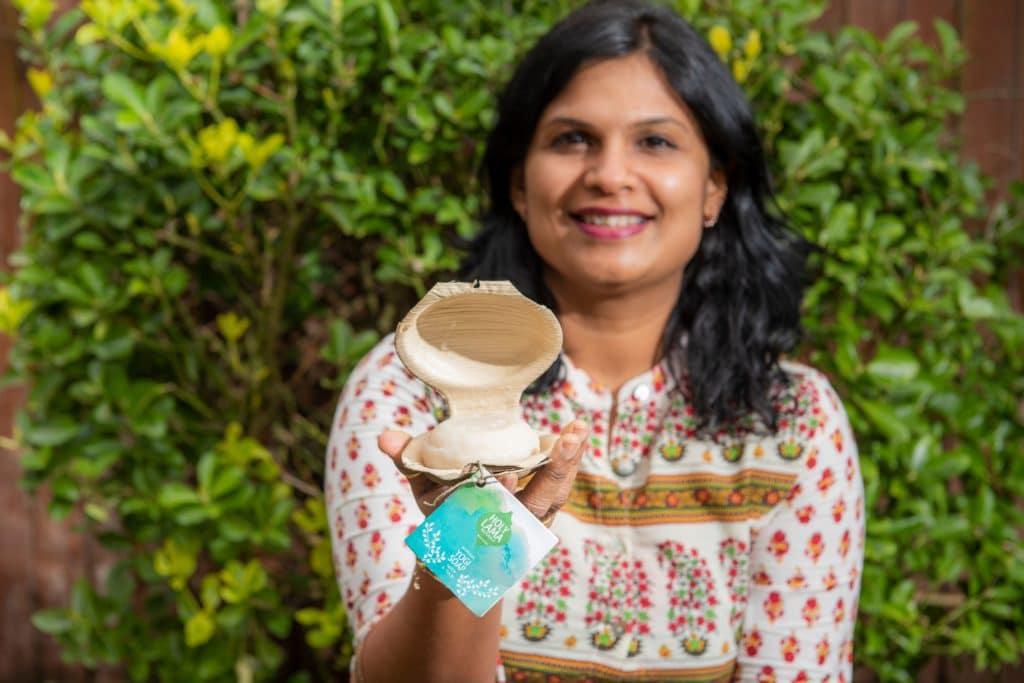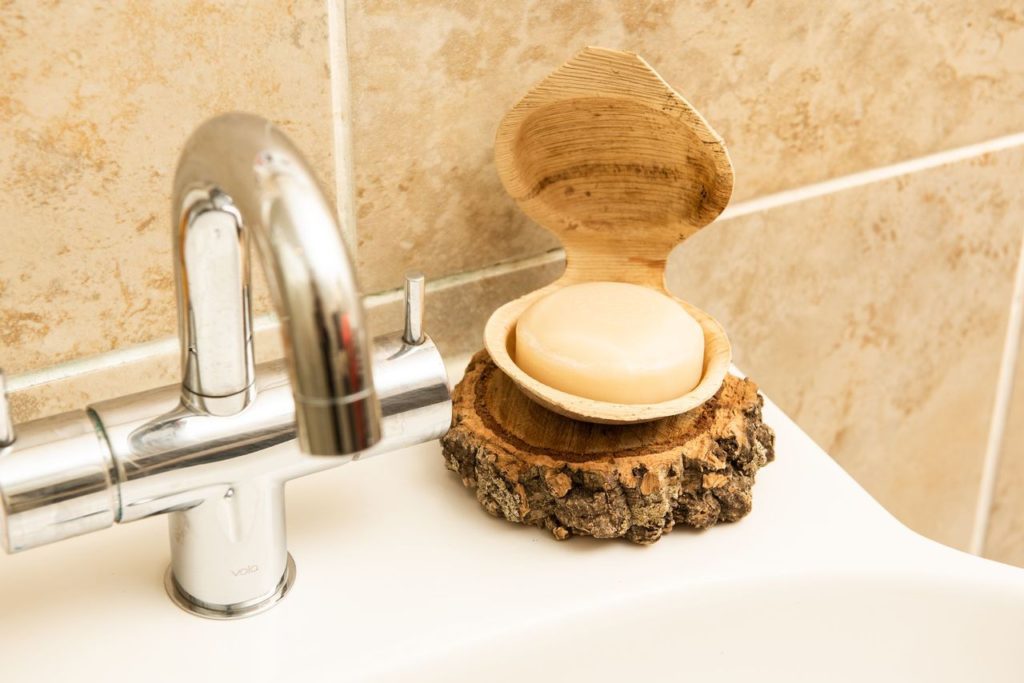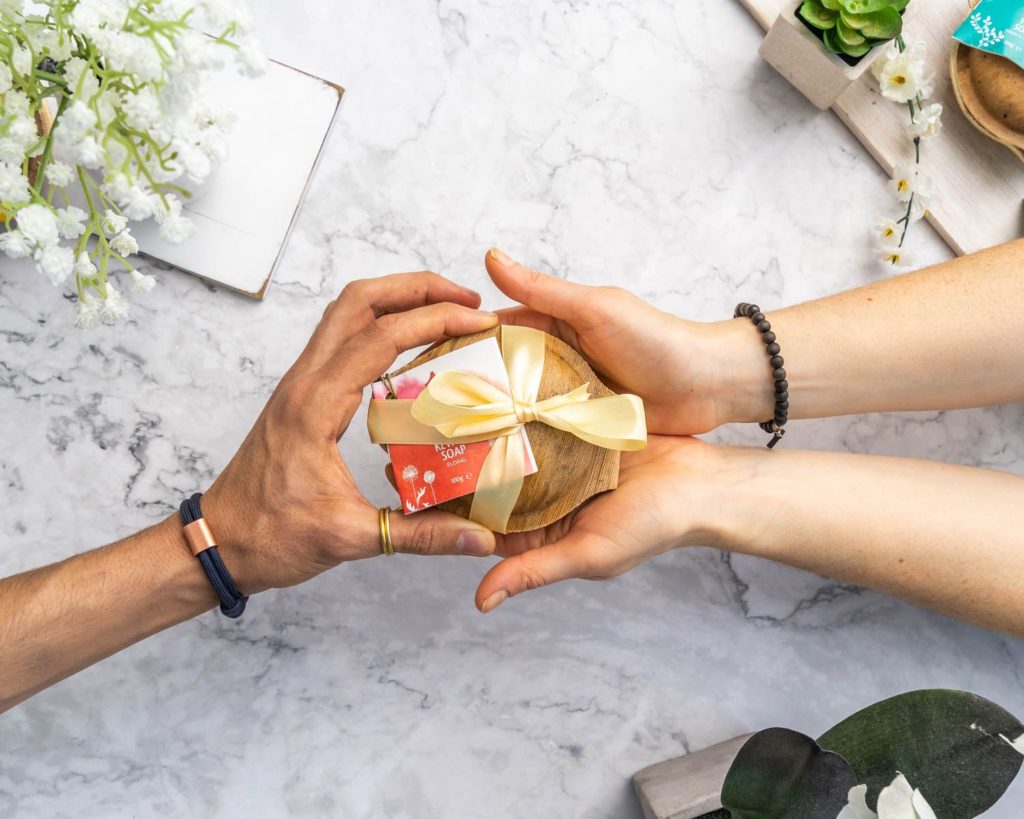India (Kerala)
An ethical women’s enterprise is creating vegan soaps that use plastic-free packaging made from a natural waste material that is easily available across South India – the areca palm.
Handmade in Kerala, Holy Lama Naturals uses leaves shed by the areca palm to create oyster-like cases for their ayurvedic soaps. Doubling as a soap dish, their packaging is entirely natural and biodegradable; even the paper tags are environmentally friendly.
We spoke to Gouri Kubair, its Managing Director, about filling the growing consumer demand for soap bars that reject liquid soaps in plastic bottles: “The oyster shell packaging was the brainchild of my father. Holy Lama has always been ahead of its time when it comes to ethical production,” she says.
Registered with The Vegan Society, the family business sources all its ingredients from local farmers, many of whom have had relations with the company going back over 70 years. That’s because the Holy Lama story begins way back in 1938.

Gouri with the Holy Lama flagship product range
It was in 1938 that Gouri’s grandfather, Mr. D V Deo, migrated from near Goa to Kerala to set up agriculture in the essential oils field. He was the first person in India to establish ‘vetivert’ (sacred native herb) cultivation on a commercial basis and is considered one of the pioneers in the Indian essential oils industry.
D V’s oldest son, Vijay, was always fascinated by the world of essential oils and perfumery, and became involved in the family business at a very young age . During the 1980s, Vijay lived in the Himalayas helping locals cultivate and extract lemongrass oil, and made a walking pilgrimage to Aja Ney. There, the presiding Lama presented him with a Thangkha of Lama Guru, which symbolises good luck. This is what inspired the Holy Lama Naturals brand name.
Over in Europe, Vijay’s oldest daughter Gouri has picked up the baton to champion the Holy Lama Naturals ethos today.

Three generations: Mr. D V Deo, Vijay and Gouri
GourI tells us that it was indeed her father who first spotted that the naturally falling leaves of the areca palm being used locally to make bowls and plates could also create soap casing. The areca palm grows widely across South India and its thick, strong leaves fall off when they are dry.
“This not only used up abundantly available local natural materials that would otherwise simply be left to rot, but also fulfilled the desire to produce wholly sustainable and compostable packaging,” she tells us. “At the time, in the late 90s, the oyster shell was unique and so we patented the shell shape, but other companies were inspired and copied us using the palm leaves to make other shaped products.”

The damage plastic can do is finally hitting home for governments around the world, forcing them and businesses to act. The factory in Kerala was set up as a government-recognised women’s enterprise, supporting and empowering marginalised women in the local community.
“Over 80% of the workforce are women, mainly from disadvantaged backgrounds. They may have been widowed, deserted by a partner, abused or left as a single parent, and under normal circumstances would have been rejected in a traditionally male dominated society. Work at the factory provides these women with much needed self-confidence and financial independence.”
The factory’s sustainable model ensures there is less than 1% wastage in production and any waste is used as fuel or cattle feed, making the company’s carbon footprint exceptionally low.
Holy Lama has also launched boxes for the soaps made from recycled paper and card in the EU and for Amnesty International. In 2020, the four soap gift set won bronze at the inaugural Free From Gift Awards, building on the success Holy Lama had seen in 2019 with their Yogi soap, which had won Best New Body Care Product at the Natural & Organic Product Awards Europe and silver at the Free From Skincare Awards.
“In 2020 we launched the new recycled paper packaging for the soaps for the European market and despite the COVID-19 limitations we successfully grew the business, building on our online sales,” Gouri explains.

Other products in the Holy Lama Naturals range are packaged in recyclable PET, however the company continues to seek out fully compostable and sustainable alternatives. “There is currently nothing on the market that can take liquid products containing water, so Holy Lama is very much in the market to find something that would provide a sustainable solution. In the same way that we found a solution for our soaps, we will continue to search for a similarly eco-friendly answer for our liquid products.”
Gouri adds that the change to sustainable packaging needs to take place across the industry and must be driven by consumer demand. This will help to force the bigger cosmetic businesses to seek solutions which will then make them affordable to smaller businesses like Holy Lama.
“We will continue to do what we can and experiment with possible local solutions as we did with the areca palm leaves, but ultimately this is a global issue which needs global solutions.”
AtlasAction: Treat yourself, and the planet, to 100% natural, beautifully fragranced and luxuriously foaming soaps from Holy Lama Naturals – truly something to get in a lather about.
Project leader
Gouri Kubair, Managing Director, Holy Lama Naturals Ltd
Support the Atlas
We want the Atlas of the Future media platform and our event to be available to everybody, everywhere for free – always. Fancy helping us spread stories of hope and optimism to create a better tomorrow? For those able, we'd be grateful for any donation.
- Please support the Atlas here
- Thank you!


